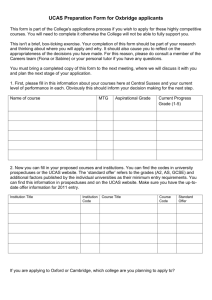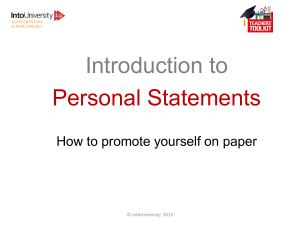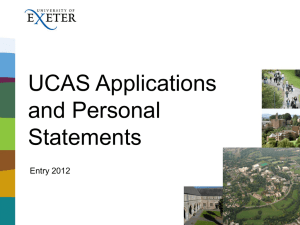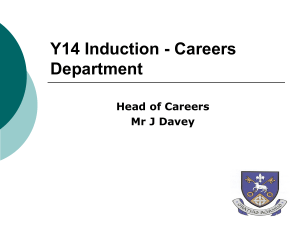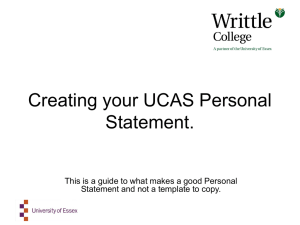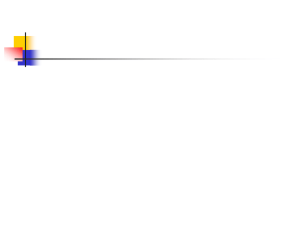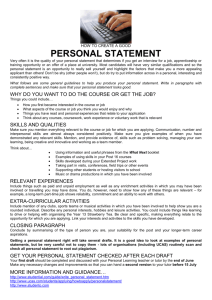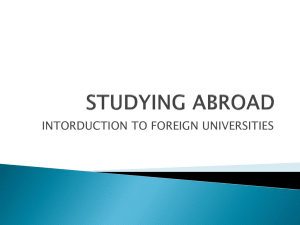UCAS Guide for Students - Moate Community School
advertisement
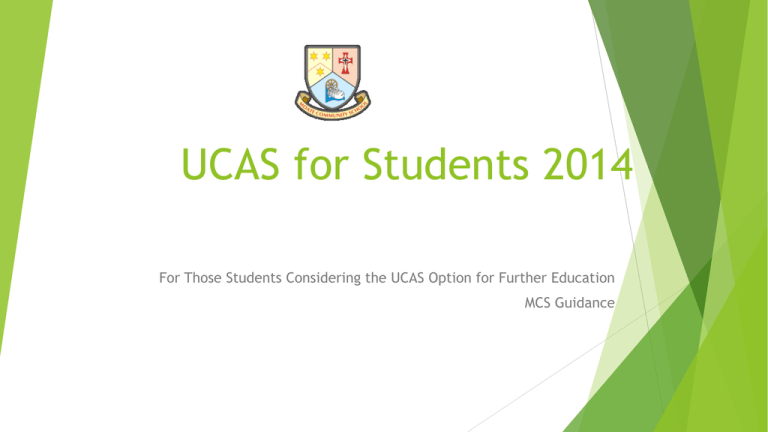
UCAS for Students 2014 For Those Students Considering the UCAS Option for Further Education MCS Guidance WHY CONSIDER UK/NI? Choice of Courses: Over 50,000 Some courses may be easier to get into Finance New Experience Family Reasons POPULAR COURSES P.E. Teaching Primary Teaching Physiotherapy Media Medicine Psychology POINTS TO CONSIDER FINANCE FEES £6000 - £9,000 per year Wales: May have subsidies Scotland: May be cheaper or even free STUDENT LOANS – pay back when earning £21,000+ Pay percentage of earnings over £21,000 MATURITY NECESSITY THE UCAS SYSTEM Apply on-line: www.ucas.com 5 CHOICES (4 if Medicine) Personal Details Educational Record: Junior Certificate Leaving Certificate predicted grades Work Experience Personal Statement School reference Choosing a Course Look further than just the names • Subjects with similar names, may have different content and structure Be prepared to spend time • Researching different courses Career progression • Certain careers will need specific degrees Which University ? Factors worth considering Where is it? City or Town? Is it too far away from home? Are public transport links good? Cost Good reputation for delivering good quality courses and facilities? How big is the University? What is the accommodation like? How good is the level of student support? How many Irish students are currently studying at the university? What is the social life like? What are the opportunities for part-time work? Reference Your referee should know you well enough to write about you and to comment on your suitability for higher education (Mr. Lowry writes the references for UCAS) The reference is a vital part of your application. UCAS cannot process the application without full details of a referee. References will not be accepted from family, other relatives or friends. Once you have checked that your personal details, your choices, your education and employment details and your personal statement are all completed you can then send your application online to your referee. Before providing a reference, your referee may ask you to make amendments to the information you have provided. After providing a reference, your referee will approve your application and send it to us. Completing the Reference: Complete in MS Word first Limited Number of Characters Do not mention individual universities that the candidate has applied to as they may adversely affect their chances with universities not mentioned If a candidate is applying to Oxford or Cambridge the thrust of the reference should be academic (75%) Reference should allude to: Existing achievement; motivation and commitment towards the chosen course; any relevant skills, achievement accredited or not; powers of analysis and independent thought, relevant curriculum enrichment and other activities, relevant work experience, proposed career plan etc. THE OFFERS SYSTEM College Admissions Tutors review application Make one of three decisions: Unconditional Offer Conditional Offer Rejection Deferral UCAS Terminology: Confirmation: when conditional offers that you have accepted become unconditional or are declined. Confirmation is dependent on your qualification/exam results. Deferral: holding an offer until the following year. Entry Profiles: comprehensive information about individual courses and institutions, including statistics and entry requirements. Entry Profiles are found on Course Search. Extra: the opportunity to apply for another course if you have used all five choices and not secured a place. Extra runs from the end of February until the end of June. Point of entry: your year of entry to the course, for example, 2 refers to the second year of the course. Track: a system where you can track the progress of your application online, reply to any offers received, and make certain amendments, for example, change of address or email. Unconditional offer: an offer given to you by a university or college if you have satisfied the criteria and can attend the course. Apply: the online application system for applying for higher education courses. Apply and its supporting information can be accessed here. Adjustment: applicants who have met and exceeded the conditions of their firm choice are given an opportunity to look for an alternative place while holding their original confirmed place. Clearing: a system used towards the end of the academic cycle. If you have not secured a place, it enables you to apply for course vacancies. Conditional offer: an offer made by a university or college, whereby you must fulfil certain criteria before you can be accepted on the relevant course. Firm offer: the offer that you have accepted as your first choice. Insurance offer: the offer that you have accepted as your second choice, in case you do not meet the requirements for your firm offer. Personal ID: a 10-digit individual number assigned to you when you register to use Apply. It is printed on every letter we send you and is displayed in the format 123-456-7890. You will be asked to provide this number if you contact our Customer Service Unit. Irish Leaving Certificate Higher Irish Leaving Certificate Ordinary UCAS Tariff Points A1 90 A2 77 B1 71 B2 64 B3 58 C1 52 C2 45 C3 A1 D1 39 33 D2 A2 26 D3 B1 20 B2 14 B3 7 Popular Courses and Popular Universities for Doing Them Offer: Teaching, Nursing/Health, Media, Business, Accountancy Performing Arts & Sports • Edge Hill, Liverpool • University of Bradford Nursing, Physiotherapy, Occupational Therapy Sports Rehab, Nutrition, Business Management, Engineering, Pharmacy, Media, TV/Film • Huddersfield University Business, Accounting, Arts, Psychology, Computers, Drama • Swansea University Portsmouth University London South Bank University - Arts, Engineering, medical, marine biology, science and law - Accounting, Early Childhood Studies, Dental Nursing, Engineering, Radiography & Pharmacy - Nursing, Psychology, Architecture, Criminology, Bio Medical, Radiography, Drama, Personal Statement The personal statement is your opportunity to tell universities and colleges about your suitability for the course(s) that you hope to study. You need to demonstrate your enthusiasm and commitment, and above all, ensure that you stand out from the crowd. Personal statement can be up to 4,000 characters or 47 lines. WHAT TO INCLUDE: Writing about the course Skills and achievements Hobbies and interests Work experience Future plans Personal Statement Tips • Why you want to study the course you are applying for? • . • If you mention hobbies/ interests try to link them to the skills/ experience required for the course. • Could be used as the basis for an interview. • Get the grammar, spelling & punctuation right. • If applying to a joint degree or for different courses it is important to explain why you are interested in both aspects/ identify common themes & skills relevant to your choices Important Qualities and Skills Competent and Confident Committed Dynamic Flexible & Adaptable Able to take the initiative Able to work in a variety of different settings Curious to learn Lifelong Learner Good organisational & time management skills Personal Statement End personal statement on a positive note, use opportunity to impress “I am looking forward to becoming a psychologist” OR “I am passionate about working with young children in the future and therefore am highly determined to make the most of my degree and achieve my ambition to become a developmental psychologist.” Personal Statements- Useful Sites www.studential.com www.thestudentroom.co.uk/personalstatements Review samples in your specific area of interest. Will guide you in the layout and structure of the Personal Statement Useful Resources: www.studential.com www.unistats.direct.gov.uk www.ucas.tv http://hpat-ulster.acer.edu.au/ www.ukcat.ac.uk/ www.admissionstests.cambridgeassessment.org.uk/adt/bmat
